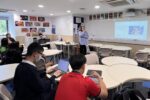Year 12 CAS – The Happy Tuesday Project

CAS stands for Creativity, Action, and Service, and it is one of three essential elements that every student must complete to receive the IB Diploma. While not formally assessed, CAS provides opportunities for students to enhance their personal and interpersonal development through hands-on learning.
One of the components of CAS is a ‘CAS Project’, a collaborative series of student-initiated CAS experiences over several months engaging students in one or more CAS strands (creativity, activity, and service). Following the five CAS stages of Investigation, Preparation, Demonstration, Action, and Reflection, students can explore their passions whilst challenging themselves to initiate purposeful action around defined goals. The following months will bring a series of interviews where the STC Media Team interviews different students around school to highlight their CAS projects and initiatives.
This week, Olivia Li speaks to the STC Media Team about her CAS project, The Happy Tuesday, of which she is a leader. After attending a workshop at the YWCA in Wo Che, she and her teammates, Charissa Ku, Sue Lam and Grace Yu, noticed the Homework Club, a group of children waiting for their parents to come to pick them up after work. They intend to help these children make crafts and learn English through fun activities.
What is The Happy Tuesday Project?
The Happy Tuesday project is held once a week for a group of children aged between five and thirteen years old at the YWCA in Wo Che, Shatin. I run the project with three other Year 12s, Charissa Ku, Sue Lam and Grace Yu. Our aim is for the children to have fun whilst improving their English; however, we also help them with their school work. We speak in English, and at the start of the activity, we introduce key phrases and words linked to the activity we have planned. For example, we made Christmas cards for their pare at Christmasnts, so we taught them how to say and write “Merry Christmas”.
Before each session, my teammates and I submit a session plan to the school social worker, Silvester Lau; he has been very helpful in getting this project started and keeping it going, and he is our liaison with the YWCA. Our plans detail the theme, the keywords and phrases, what to make, and what materials we will need. Once the plan is approved, we will make the craft at home and take it along to the session so that the children can easily see what we are making that day.
After each session, we debriefed with Silvester and gave our thoughts on how the session went. We now put timings on our session plan, as on our first session, we let the children out late. Our expectations of the children’s level of English was too high, so we have lowered the level of English taught in my plans.
What have you learned from your CAS Project?
I have learnt not to put too much pressure on myself, as I wanted the sessions to run smoothly. We realised that we had to speak Cantonese in the first session, as the children could not communicate English. I felt my Cantonese was not good enough and was so anxious that I couldn’t open my mouth. In the second session, I forced myself to speak. Even if my Cantonese isn’t perfect, I realised the children could understand what I said.
How has the COVID-19 pandemic affected the Happy Tuesday Project?
Since face-to-face schooling stopped, the Homework Club was also closed. We had been doing art and craft activities during our sessions, but that wasn’t possible only without the materials. We ran a couple of online sessions with fun activities in English, such as Kahoot and Chinese New Year Bingo. We had to present the words first so that the children could identify them in the games, but our sessions started to feel more like an English lesson than a fun afterschool club.
We thought of other ways to keep the session going with only two children turning up. We were going to make and send activity packs so the children could make or do something hands-on together online. Unfortunately, YWCA isn’t open currently, so we can’t drop the packs off and let parents pick them up. We have reluctantly decided to wait until the Homework Club opens again.
What has been the most meaningful part of this project?
It has to be watching the children make the craft and talking to them. It makes all the stress of planning worth the effort. Even the older children come to the crafting table, and they go away with something that they have made themselves, which makes me very happy, as it shows we have found an activity that interests all of them.
We also take pictures after each session of the crafts the children made. Moreover, hearing them say and write the new phrases they have learnt makes me very proud of the children.
Written by: Georgiana Watt
Edited by: Kadence Wong

